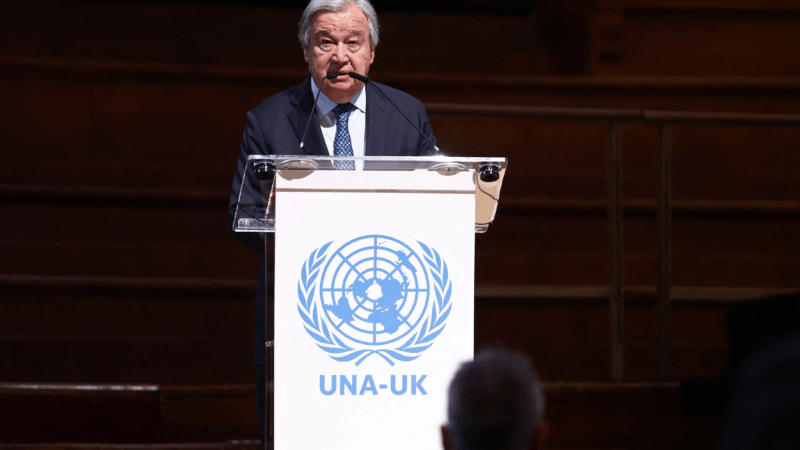Supreme Court confronts another challenge to the Voting Rights Act
Race and politics were front and center at the U.S. Supreme Court on Monday as the justices took up a voting rights case involving Louisiana’s congressional redistricting after the 2020 Census. The case is nearly identical to a case the Supreme Court ruled on two years ago from Alabama, though the outcome could make it more difficult for minorities to prevail in redistricting cases.
Louisiana’s population is roughly 30% Black, but after the 2020 Census, the state legislature drew new congressional district lines that provided for only one majority-Black district in a state that has six congressional seats. That’s the same thing Alabama did after the Census, only to be slapped down by the Supreme Court two years ago when a narrow court majority ruled that the state had illegally diluted the Black vote in violation of the Voting Rights Act.
There is one difference between the Alabama and Louisiana cases: Alabama didn’t create a second majority-Black district until ordered to do so by the Supreme Court. In Louisiana, the state legislature, after losing before multiple courts, saw the handwriting on the wall and drew a new map that provided for a second majority-Black district. But that new district was challenged by a group of Louisiana citizens identifying themselves as “non-African American” voters. They lost in the lower courts and appealed to the Supreme Court, which heard arguments in the case Monday.
State Solicitor General Benjamin Aguiñaga told the justices that Louisiana’s legislature, faced with the prospect of federal judges drawing new district lines for congressional seats, bit the bullet and drew the new map with a second majority-minority district.
Aguiñaga noted that the alternative map would have put key Republicans in jeopardy, including House Speaker Mike Johnson and House Majority Leader Steve Scalise.
“It’s an election year. We’re talking about the speaker of the House. No rational state gambles with those high-stakes seats in that situation,” Aguiñaga said.
Chief Justice John Roberts, who wrote the court’s opinion in the Alabama case requiring a second majority-Black district, seemed skeptical about the Louisiana map because it created less compact districts than were drawn in Alabama.
“You think the drawing of this district was not predominantly based on race?” he asked, adding, “It’s a snake that runs from one end of the state to the other … I mean, how is that compact?”
Lawyer Stuart Naifeh, representing the NAACP Legal Defense & Educational Fund, replied that the original map proposed by civil rights groups was indeed more compact, but that the groups ultimately agreed to the legislature’s compromise map, which protected incumbents.
Supposing, asked Justice Amy Coney Barrett, there was no incumbency justification here from the legislature. “What if they … didn’t talk about politics, just said, ‘We’re doing this because of race. We don’t like that other map; race, race, race.'” Would such racial motivations, she asked, be harder to justify than the political reasons given by the state?
Finally, Edward Greim, representing the “non-Black” challengers, faced a pragmatic question from Justice Elena Kagan.
“What was Louisiana supposed to do?” she asked, noting that courts explicitly give states in Louisiana’s position “breathing room” so that they may decide how best to draw their congressional maps. She added that “this was one state that decided on this choice — that you don’t agree with — but it was well, well, well within the parameters of a good-faith reasonable choice.”
Although all six of the court’s conservatives expressed serious doubts about the state legislature’s map on Monday, the fact is that just two years ago the same six sounded equally skeptical about the Alabama redistricting map that the justices subsequently upheld as required by the Voting Rights Act.
Bottom line: reading the tea leaves in the Louisiana case is a fool’s errand.
United Nations leaders bemoan global turmoil as the General Assembly turns 80
On Saturday, the UNGA celebrated its 80th birthday in London. Speakers including U.N. Secretary-General António Guterres addressed global uncertainty during the second term of President Trump.
Parts of Florida receive rare snowfall as freezing temperatures linger
Snow has fallen in Florida for the second year in a row.
European leaders warn Trump’s Greenland tariffs threaten ‘dangerous downward spiral’
In a joint statement, leaders of eight countries said they stand in "full solidarity" with Denmark and Greenland. Denmark's Prime Minister Mette Frederiksen added: "Europe will not be blackmailed."
Syrian government announces a ceasefire with the Kurdish-led Syrian Democratic Forces
Syria's new leaders, since toppling Bashar Assad in December 2024, have struggled to assert their full authority over the war-torn country.
U.S. military troops on standby for possible deployment to Minnesota
The move comes after President Trump again threatened to invoke the Insurrection Act to control ongoing protests over the immigration enforcement surge in Minneapolis.
Martin Luther King Jr. had a dream … about health care
A doctor from Nigeria tells what Martin Luther King Jr. taught him about health, Justice and inequality.







